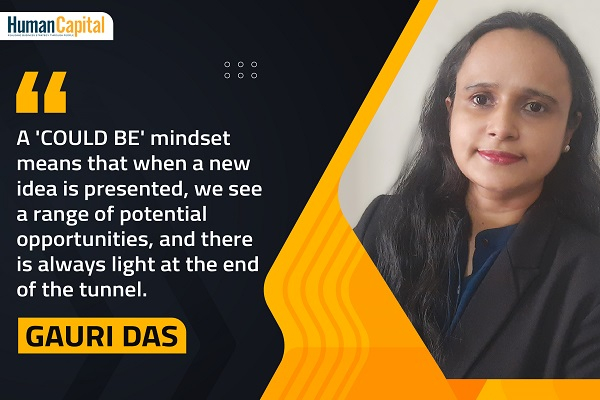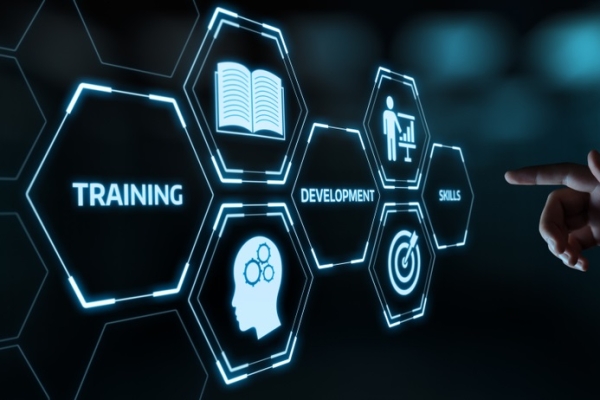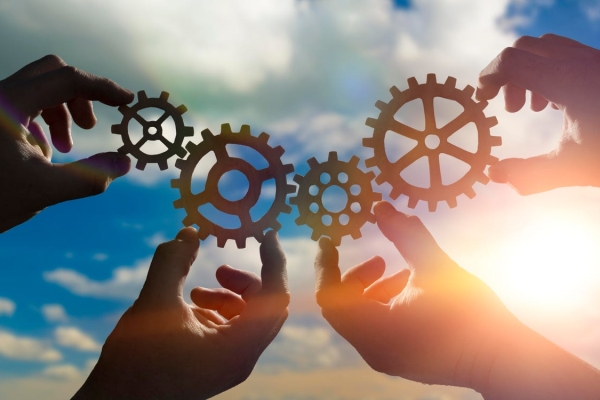A ‘COULD BE’ mindset means that when a new idea is presented, we see a range of potential opportunities, and there is always light at the end of the tunnel.
An experiment in 1987 proved the difference between IS and COULD BE mindsets. Participants were sent to a table in a room with paper, pencil, rubber band, polygraph pen, and a hairdryer attachment. They were asked to use paper and pencil to rank the objects. They were then informed that a mistake needed to be corrected, but the pencil had no eraser—how to fix the mistake?
When participants were told that the rubber band IS a rubber band, they didn’t think of using it as an eraser. However, if they were told that the rubber band COULD BE a rubber band, it expanded possibilities. Only 3% of those told that the rubber band IS a rubber band saw the possibility that it could also be an eraser, whereas 40% of the group informed that it COULD BE a rubber band found the potential for it to also be an eraser.
Thinking of something as IS can be self-limiting. But the moment we enter into COULD BE, the opportunities start opening up. The pandemic has only exacerbated the fear of uncertainty for many who are going in a similar predicament in their life. I want to offer my 6P model to help people navigate and overcome life’s challenges.
The 6P Model
1. Purpose
The purpose is our “why”, which matters a lot. Purpose involves having a meaning in life that sets the direction for us and helps us create our life goals. As we know, a life without an objective is not meaningful. Purpose not only adds meaning to life but also helps when life throws challenges on us. In tough situations, it is our purpose that keeps us going. Purpose makes us passionate about our goals and without passion, one can’t achieve anything significant. Besides, our purpose helps us live longer and happier. This was proved in research by Harvard University researchers.
2. Perseverance
Once you know your purpose and are passionate about achieving it, the next step is to start showing up and taking responsibility. Perseverance is about dealing with our vulnerabilities and harnessing their strength. Vulnerability is the antidote for fear of judgment.
Society plays a vital role in shaping our mindsets. We are always told the smartest one wins, and hence, we consume ourselves in looking smart and better than others. This leads to a fixed mindset. We try to prove ourselves right with such a mindset and don’t learn from our mistakes and setbacks; rather, we avoid anything where we may fail.
For example, I didn’t lose the race since I never participated. Such thinking limits our growth. Psychologist Dr Carol Dweck, in her 2006 book Mindset: The New Psychology of Success, described both growth and fixed mindsets. According to her, people who believe their talents can be developed through continuous efforts, feedback, and other strategies have a growth mindset. These individuals achieve more than those with a more fixed mindset.
Fixed mindset people believe that talents are natural gifts and hence can’t be increased. People with a growth mindset do better since they don’t worry about looking smart but instead work on learning, and hence, they create more opportunities.
3. Patience
Do you know how long people are willing to wait for a website to open? Professor Ramesh K. Sitarman of the University of Massachusetts studied 6.7 million users and concluded that viewers abandon a video after a two-second delay. According to Amazon, they lose $1.6 billion if a page takes one second longer to load. Google measured that if a search is four-tenths of a second delayed, it translates into a loss of up to 8 million searches per day. Our attention span, as well as our capacity to wait, is dwindling. We look for instant gratification. However, the road to achieving our goals is a long one, and it takes time and consistent effort. When we are devoid of patience, we are unwilling to walk it and get discouraged too soon.
In her 2012 study, Schnitker examined whether patience helps students achieve their goals. Students completed five surveys during a semester, and it was found that those with patience put in more effort towards their goals than others. Not only that, those with interpersonal patience were more satisfied with achieving their objectives.
4. Practice
Eduardo Briceño talks about the ‘learning zone’ and the ‘performance zone’. The performance zone entails real-time execution with no tolerance for failures, whereas the learning zone is where we attempt, fail and try again to succeed. As a culture, we are always required to perform. Even at school, we were expected to come up with correct answers. Workplaces are no exception—we are always in a performance zone and, as a result, unable to make significant progress.
What we need is a deliberate practice that’s purposeful, well-organised and systematic. While regular practice may involve mindless repetition, deliberate practice requires focused attention with a fixed goal of improving performance in a particular area.
5. Persistence
A psychological study gave us the equation Ability × Persistence = Performance, indicating that it’s not only the talent that leads to success but also persistence. We’ve all had a classmate who was the best until middle school and then went downhill. There was talent, but persistence was lacking.
According to the American Psychological Association (APA), the number one barrier to success is willpower. Surprisingly, 71% of the respondents felt they could increase their willpower. You are way ahead of the 71% if you can not only think but also work on improving willpower with perseverance. Charles Darwin wrote in a letter that he had always suspected that humans did not differ much in their intellect, only in their “zeal and hard work.”
These five Ps lead to the sixth P: Possibility. With this mindset, one searches for and finds opportunities even when there appear to be none.
Do you look forward to permanently working from home after the pandemic subsides?
Trending
-
SBI General Insurance Launches Digital Health Campaign
-
CredR Rolls Out 'Life Happens' Leave For Its Employees
-
Meesho Announces 30-Week Gender-Neutral Parental Leave Policy
-
Microsoft Unveils Tech Resilience Curriculum To Foster An Inclusive Future
-
60% Indian Professionals Looking For Job Change Due To COVID: Survey
-
SpringPeople And Siemens Collaborate For Digital Transformation Push
-
86% Professionals Believe Hybrid Work Is Essential For Work Life Balance: Report
-
Almost 1 In Every 3 People's Personal Life Affected Due To Work Stress
-
Meesho Rolls Out Reset And Recharge Policy For Employees
-
80% Of Talent Leaders & Academics Say Pandemic Changed Skill Needs For Youth: Report
-
Hero Electric Rolls Out 'Hero Care' Program For Employees
-
Human Capital In Collaboration With ASSOCHAM Hosts Virtual Conference
-
IKEA India, Tata STRIVE Collaborate To Create Employability And Entrepreneurship Opportunities
-
SAP India, Microsoft Launch Tech Skilling Program for Young Women
-
DXC Technology, NASSCOM Collaborate For Employability Skills Program
-
Lenskart To Hire Over 2000 Employees Across India By 2022
-
Mindtree Launches Learn-and-Earn Program
-
Tata AIA Extends 'Raksha Ka Teeka' To Its Employees
-
Swadesh Behera Is The New CPO Of Titan
-
NetConnect Global Plans To Recruit 5000 Tech Professionals In India
-
Hubhopper Plans To Hire 60% Of Indian Podcasters By 2022
-
Corporate India Needs More Women In Leadership Roles: Report
-
Aon to Invest $30 Million and Create 10,000 Apprenticeships by 2030
-
Tech Mahindra Launches ‘Gift a Career’ Initiative for Upskilling of Youth
-
40% Women Prefer Flexible Working Options in Post-COVID World: Survey
-
3 out of 4 companies believe they can effectively hire employees virtually: Report
-
Vodafone , CGI and NASSCOM Foundation launch digital skills platform
-
Odisha: Bank, postal employees to deliver cash for elderly, differently-abled persons
-
Skill India launches AI-based digital platform for "Skilled Workforce"
-
Hiring activity declines 6.73% in first quarter: Survey
-
70% startups impacted by COVID-19 pandemic
-
Bajaj Allianz Life ropes in Santanu Banerjee as CHRO
-
Over 70 Percent MSMEs look at cutting jobs to sustain businesses
-
93 Per Cent employees stressed about returning to office post-lockdown
-
Johnson & Johnson India announces family benefits for same gender partners
-
Indian firms turning friendly towards working mothers
-
Welspun India names Rajendra Mehta as new CHRO
-
Wipro partners with NASSCOM to launch Future Skills platform



Human Capital is niche media organisation for HR and Corporate. Our aim is to create an outstanding user experience for all our clients, readers, employers and employees through inspiring, industry-leading content pieces in the form of case studies, analysis, expert reports, authored articles and blogs. We cover topics such as talent acquisition, learning and development, diversity and inclusion, leadership, compensation, recruitment and many more.
Subscribe Now












































Comment